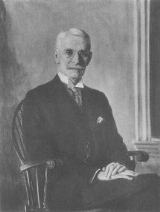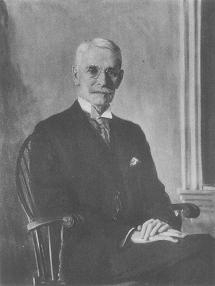
Charles V. Chapin
Encyclopedia

Health Officers
Health Officers is a common term used in the United States and elsewhere for public health officials. Public health officials may serve at the global, federal, state, county, or municipal level...
for Providence, Rhode Island
Providence, Rhode Island
Providence is the capital and most populous city of Rhode Island and was one of the first cities established in the United States. Located in Providence County, it is the third largest city in the New England region...
between 1884 and 1932. He also served as President of the American Public Health Association
American Public Health Association
The American Public Health Association is Washington, D.C.-based professional organization for public health professionals in the United States. Founded in 1872 by Dr. Stephen Smith, APHA has more than 30,000 members worldwide...
in 1927.
His observations on the nature of the spread of infectious disease were dismissed at first, but eventually gained widespread support. His book, The Sources and Modes of Infection, was frequently read in the United States and Europe.
The Providence City Hospital was re-named the Charles V. Chapin Hospital in 1931 to recognize his substantial contributions to improving the sanitary condition of the city of Providence.
Career
Born in ProvidenceProvidence, Rhode Island
Providence is the capital and most populous city of Rhode Island and was one of the first cities established in the United States. Located in Providence County, it is the third largest city in the New England region...
, C. V. Chapin became a pre-eminent public health
Public health
Public health is "the science and art of preventing disease, prolonging life and promoting health through the organized efforts and informed choices of society, organizations, public and private, communities and individuals" . It is concerned with threats to health based on population health...
official in the United States. With a career spanning 48 years, he served as the Superintendent of the Providence Department of Health and was considered to be the "Dean of City Health Officials". He became President of the American Public Health Association
American Public Health Association
The American Public Health Association is Washington, D.C.-based professional organization for public health professionals in the United States. Founded in 1872 by Dr. Stephen Smith, APHA has more than 30,000 members worldwide...
and won numerous awards from this organization. He served as President of the American Epidemiological Society. In 1928 he was awarded the Public Welfare Medal
Public Welfare Medal
The Public Welfare Medal is awarded by the U.S. National Academy of Sciences "in recognition of distinguished contributions in the application of science to the public welfare." It is the most prestigious honor conferred by the Academy...
from the National Academy of Sciences
United States National Academy of Sciences
The National Academy of Sciences is a corporation in the United States whose members serve pro bono as "advisers to the nation on science, engineering, and medicine." As a national academy, new members of the organization are elected annually by current members, based on their distinguished and...
. He also received the W.T. Sedgwick Medal
Sedgwick Memorial Medal
The Sedgwick Memorial Medal, given by the American Public Health Association, was established in 1929 for distinguished service and advancement of public health knowledge and practice. It is considered the APHA's highest honor....
of the APHA. He won honorary degrees from Brown University
Brown University
Brown University is a private, Ivy League university located in Providence, Rhode Island, United States. Founded in 1764 prior to American independence from the British Empire as the College in the English Colony of Rhode Island and Providence Plantations early in the reign of King George III ,...
, Rhode Island State College, and Yale
YALE
RapidMiner, formerly YALE , is an environment for machine learning, data mining, text mining, predictive analytics, and business analytics. It is used for research, education, training, rapid prototyping, application development, and industrial applications...
, where C.E.A. Winslow was chair.
Publications and accomplishments
He was a prolific writer. Two of his classic works were The Sources and Modes of Infection (1910) and A Report on State Public Health Work Based on a Survey of State Boards of Health (1915). Six of his papers were in the category of public-health administration, five were in communicable diseases and five were published in epidemiologyEpidemiology
Epidemiology is the study of health-event, health-characteristic, or health-determinant patterns in a population. It is the cornerstone method of public health research, and helps inform policy decisions and evidence-based medicine by identifying risk factors for disease and targets for preventive...
and vital statistics
Vital statistics
Vital statistics are the information maintained by a government, recording the birth and death of individuals within that government's jurisdiction. These data are used by public health programs to evaluate how effective their programs are...
. Later review found five of the papers particularly noteworthy, including The Fetich of Disinfection (1906), and Studies in Air and Contact Infection at the Providence City Hospital (1911). These two contained the basic tenets of the Sources and Modes of Infection cited above. He published on the administrative and resource aspects of the public's health, in How Should We Spend the Health Appropriation? (1913). His contributions to community hygiene
Hygiene
Hygiene refers to the set of practices perceived by a community to be associated with the preservation of health and healthy living. While in modern medical sciences there is a set of standards of hygiene recommended for different situations, what is considered hygienic or not can vary between...
and sanitary science were considered lasting. He led successful community hygiene practices to combat the pandemic flu of 1918 at Providence.
Chapin taught that diseases come from persons and not things, and that they are spread only by contact, food, and animal carriers. He inspired others to evaluate all of the collective efforts of community hygiene in terms of outcomes, an early effort to quantify the social sciences
Social sciences
Social science is the field of study concerned with society. "Social science" is commonly used as an umbrella term to refer to a plurality of fields outside of the natural sciences usually exclusive of the administrative or managerial sciences...
aspect of public-health practice. Further, he was a forerunner to the notion of health disparities among the poor, having published Deaths among Taxpayers and Non-Taxpayers (1924), an early connection of health
Health
Health is the level of functional or metabolic efficiency of a living being. In humans, it is the general condition of a person's mind, body and spirit, usually meaning to be free from illness, injury or pain...
and economic status. In 1926 he published Changes in Contagious Diseases, which described the variety of infectious agents in smallpox
Smallpox
Smallpox was an infectious disease unique to humans, caused by either of two virus variants, Variola major and Variola minor. The disease is also known by the Latin names Variola or Variola vera, which is a derivative of the Latin varius, meaning "spotted", or varus, meaning "pimple"...
vs. scarlet fever
Scarlet fever
Scarlet fever is a disease caused by exotoxin released by Streptococcus pyogenes. Once a major cause of death, it is now effectively treated with antibiotics...
. Altogether he published more than 113 titles. During his lifetime it was written, that his contributions to the philosophy and methodology of public health were greater than, "any living man". He was compared to his forerunners in the field, Frank, Edwin Chadwick
Edwin Chadwick
Sir Edwin Chadwick KCB was an English social reformer, noted for his work to reform the Poor Laws and improve sanitary conditions and public health...
, Simon, Lemuel Shattuck, William Thompson Sedgwick
William Thompson Sedgwick
William Thompson Sedgwick was a key figure in shaping public health in the United States.William T...
, and Hermann Biggs
Hermann Biggs
Hermann Michael Biggs was an American physician and pioneer in the field of public health who helped apply the science of bacteriology to the prevention and control of infectious diseases...
, as one of the greats of all time in public health. These comments and summary of the man and his work were written C.E.A. Winslow
Charles-Edward Amory Winslow
Charles-Edward Amory Winslow was an American bacteriologist and public health expert who was, according to the Encyclopedia of Public Health, "a seminal figure in public health, not only in his own country, the United States, but in the wider Western world."Winslow was born in Boston,...
.
Publications
- Municipal Sanitation in the United States. Snow & Farnham, Providence, RI. 1901.
- The Sources and Modes of Infection. John Wiley & Sons, New York. 1910.

